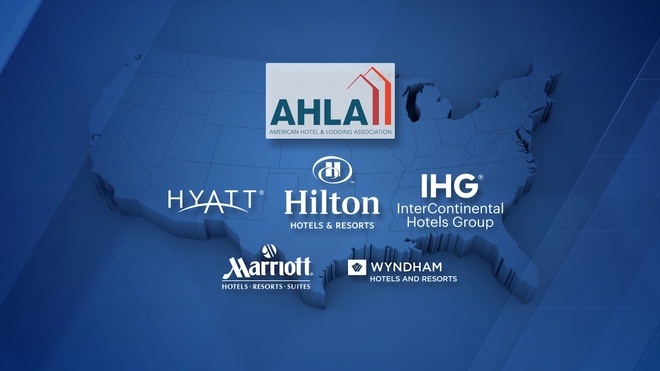In Reversal, Hotel Industry To Back Panic Buttons For Workers
by Mark Albert, on Sep 6, 2018 10:06:00 AM

LAS VEGAS — In a major reversal, the U.S. hotel industry is prepared to launch an employee safety initiative this week, after unions coast to coast pressured major brands to give panic buttons to their workers, the Hearst Television National Investigative Unit has learned.
Top executives of at least five of the biggest American hotel brands — Hilton, Hyatt, IHG, Marriott and Wyndham — are scheduled to hold a news conference Thursday afternoon in Washington to unveil their plans, which will go "far beyond" the slice of hotel workers who belong to unions and will impact “hundreds of thousands” of employees, sources say.
In addition, a representative of the Time's Up Legal Defense Fund, launched as part of the #MeToo movement combating sexual assault in the workplace, will also be part of the announcement from the American Hotel and Lodging Association.
Hotels in Las Vegas; New York; Washington, D.C.; and some properties in Los Angeles provide panic buttons as part of union contracts. Safety devices are required by law in Seattle; Chicago; the unincorporated parts of Sacramento County in California; and Miami Beach, Florida.

But not everyone supports them: the city council in Long Beach, California, has voted not to require them, and a bill in the California State Senate — which had already been approved in the Assembly — to require them statewide failed to move out of committee last month.
CalChamber, which represents businesses, did not object to panic buttons themselves, but warned some of the requirements of hotels were "unworkable" and once called the bill a "job killer."
'We need this'
When the worst mass shooting in modern U.S. history occurred in October in Las Vegas, none of the unionized hotels provided panic buttons, including the Mandalay Bay, where the shooter rained down bullets and terror on the concertgoers gathered below. Now, less than a year later, almost all of the major hotels have agreed to give safety devices to their workers.
The union that represents 50,000 hotel workers in Las Vegas and in Reno, the Culinary Workers Union Local 226, did have one worry about panic buttons, however: digital snooping.
"It is a big concern," union leader Geoconda Arguello-Kline explained in an interview at the local union's headquarters off the Las Vegas strip recently.

She led negotiations with Sin City's most famous hotels, extracting a promise that they would not use panic buttons to continuously track workers. Members had voted in May to authorize a strike if they didn't get panic buttons.
Arugello-Kline said it amounted to an ultimatum.
"We say: 'We need this. We need this because it's protecting people's lives," she told Hearst Television.
Union member Dallamy Santos says a guest at the hotel where she's worked for 17 years once "offered me money" for a sex act. The hotel does not provide workers with panic buttons.
"If they would like to have their workers safe," Dallamy said in an interview, "they will do it."
'Protect their loved ones'
New, portable panic buttons — on an iPhone, keychain, or wearable device — use small Bluetooth beacons to overcome limitations in GPS.

The current GPS determines a person's location based on latitude and longitude, but not which floor of a high-rise hotel a person is on. Bluetooth beacons and other Bluetooth-enabled devices such as thermostats and smart door locks, can triangulate a person's position down to within 5 to 10 feet, allowing first responders to know which floor, and which room, a victim of a shooting, assault or medical emergency is in.
In an interview, Robb Monkman, the CEO of React Mobile, a provider of Bluetooth-enabled panic buttons, explained the sobering source of his inspiration for starting his Seattle-based company: a frightening home invasion.
"Two guys, who were armed with guns, broke through our front door, they ended up holding us up at gunpoint, they robbed us and they ended up taking one of our roommates hostage," Monkman recalled.
"I realized then that when you feel that steel of a gun pressed against [your] forehead, that it makes it just about impossible to reach for your phone to call for help."
"We want to give people a useful tool that can protect their loved ones," Monkman added.
He demonstrated for the National Investigative Unit the response times of the three main types of panic buttons his company sells to hotels, universities, railroads, and other industries. The cost to a hotel varies between $0.70 and $2.00 per room, depending on the size of the location and layout, Monkman said. There are many other companies that also sell Bluetooth-dependent safety devices.
"You can click this as many times as you want and the alert will go off," Monkman explained while pressing a keychain panic button.
A few seconds after he pressed the button, a siren wailed and a message box popped up on a laptop security monitor nearby that read, "SOS alert activated."
Watch below as we put the devices to the test and see how long it takes for panic buttons on keychains, iPhones, and wearable items to send for help.
As Seen On ABC News
Watch the video and read the story here.

